 Press Statement, July 13, 2012 – Human rights group Karapatan today affirmed the observations of the United Nations Special Rapporteurs (UN-SR) on human rights defenders and extrajudicial killings on the “growing number of threats and killings of rights defenders” in the Philippines. The statement by the UN mandate holders was released on July 9, two weeks prior to Phil. Pres. Noynoy Aquino’s State of the Nation Address (SONA).
Press Statement, July 13, 2012 – Human rights group Karapatan today affirmed the observations of the United Nations Special Rapporteurs (UN-SR) on human rights defenders and extrajudicial killings on the “growing number of threats and killings of rights defenders” in the Philippines. The statement by the UN mandate holders was released on July 9, two weeks prior to Phil. Pres. Noynoy Aquino’s State of the Nation Address (SONA).
UN Special Rapporteurs on Human Rights Defenders Margaret Sekaggya and on Extrajudicial Killings, Christof Heyns released the following statement, which can be accessed through http://www.ohchr.org/en/NewsEvents/Pages/DisplayNews.aspx?NewsID=12333&LangID=E.
Cristina Palabay, Karapatan spokesperson, said such observations hold true as the rights group has documented 95 victims of extrajudicial killings under the two-year term of Aquino, from July 2010 to June 30, 2012. Karapatan also recently received report on the killing of Arnolfo Vaflor on July 9. Vaflor was a member of an affiliate of the Negros Farm and Sugar Workers in Negros Occidental. Vaflor’s killing happened only a week after the killing of Wilhelm Geertman, a Dutch volunteer who had been in the Philippines for more than four decades.
“The series of attacks and violence against organized communities and human rights defenders and the latest wave of killings of human rights and environmental activists, like Romualdo Palispis, Geertman and Vaflor indicate the heightening terror and violence instigated by state security forces and the Aquino government. This comes alongside the serious cases of rights violations brought about by militarization of whole organized communities especially in the Bondoc Peninsula; the illegal arrest based on trumped-up charges against Makabayan coordinator and lay church worker Agnes Mesina; and the indiscriminate firing at the office of Bayan Muna in Catarman, Northern Samar,” Palabay explained.
Karapatan also confirms Sekaggya’s statement, pointing out that those defending the rights of local communities where there are disputes over land rights and campaigns against mining and dam projects are “often met with violence.”
“Among the 95 victims, 43 were rights workers in various organizations and institutions. Many are farmers, indigenous peoples and environmental activists. The communities opposing anti-people projects are victimized through threats, harassment, torture, and repression by the AFP and paramilitary groups. This is the real purpose of Aquino’s Oplan Bayanihan – to quell legitimate people’s opposition and enable the plunder of the country’s resources at the expense of the people’s economic rights,” Palabay said. ###
Reference: Cristina “Tinay” Palabay, Spokesperson, 0917-5003879
Angge Santos, Media Liaison, 0918-9790580
———————————————————————
PUBLIC INFORMATION DESK
publicinfo@karapatan.org
———————————————————————
Alliance for the Advancement of People’s Rights
2nd Flr. Erythrina Bldg., #1 Maaralin corner Matatag Sts., Central District
Diliman, Quezon City, PHILIPPINES 1101
Telefax: (+63 2) 4354146
Web: http://www.karapatan.org
KARAPATAN is an alliance of human rights organizations and programs, human rights desks and committees of people’s organizations, and individual advocates committed to the defense and promotion of people’s rights and civil liberties. It monitors and documents cases of human rights violations, assists and







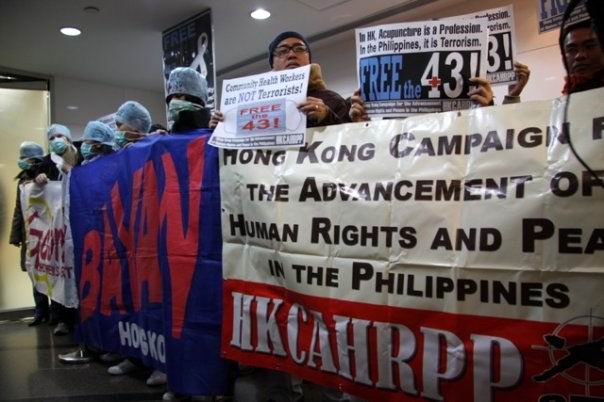


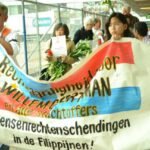 A protest picket/vigil was held at the Philippine Embassy in The Hague, The Netherlands today, 6 July, to condemn the killing of Dutch national Willem Geertman, and to demand swift justice from the government of President Benigno Aquino III.
A protest picket/vigil was held at the Philippine Embassy in The Hague, The Netherlands today, 6 July, to condemn the killing of Dutch national Willem Geertman, and to demand swift justice from the government of President Benigno Aquino III.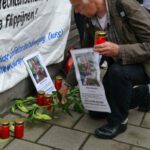 Theo Droog, chairperson of the Nederlands-Filippijns Solidariteitsbeweging (NFS, Dutch-Philippine Solidarity Movement) led a delegation that went inside the embassy to talk with the Philippine ambassador and asked the ambassador to deliver their strong letter-petition to Philippine President Benigno Aquino III.
Theo Droog, chairperson of the Nederlands-Filippijns Solidariteitsbeweging (NFS, Dutch-Philippine Solidarity Movement) led a delegation that went inside the embassy to talk with the Philippine ambassador and asked the ambassador to deliver their strong letter-petition to Philippine President Benigno Aquino III.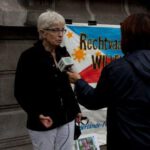 “We call on the Philippine government under Aquino to carry out forthwith a thorough and impartial investigation and to criminally prosecute the suspects.
“We call on the Philippine government under Aquino to carry out forthwith a thorough and impartial investigation and to criminally prosecute the suspects.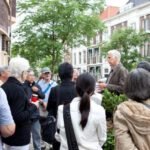 The letter, which was endorsed by the brothers and sister of Willem, was signed by a member of the Dutch Parliament, high-ranking Dutch church leaders and pastors, lawyers, university professors and academics, union leaders, development workers, medical doctors, Carmelite priests, human rights and migrant rights advocates and former Dutch development volunteers in the Philippines.
The letter, which was endorsed by the brothers and sister of Willem, was signed by a member of the Dutch Parliament, high-ranking Dutch church leaders and pastors, lawyers, university professors and academics, union leaders, development workers, medical doctors, Carmelite priests, human rights and migrant rights advocates and former Dutch development volunteers in the Philippines.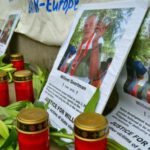 A mural, which says “Rechtvaardigheid voor Willem Geertman en alle slachtoffers van mensenrechtenschendingen in de Filippijnen” (Justice for Willem Geertman and all victims of human rights violations in the Philippines), flowers and candles were mounted in front of the embassy with the photos of Geertman.
A mural, which says “Rechtvaardigheid voor Willem Geertman en alle slachtoffers van mensenrechtenschendingen in de Filippijnen” (Justice for Willem Geertman and all victims of human rights violations in the Philippines), flowers and candles were mounted in front of the embassy with the photos of Geertman.